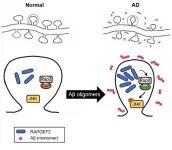(Press-News.org) Emerging smart mobile health (or mHealth) technologies are changing the way patients track information related to diagnosed conditions. A new study examined the health and economic impacts of mHealth technologies on the outcomes of diabetes patients in Asia. The study concluded that compared to patients who did not use mHealth applications, patients who used the apps had better health outcomes and were able to regulate their health behavior more effectively. They also had fewer hospital visits and lower medical costs.
The study was conducted by researchers at Carnegie Mellon University (CMU) and New York University (NYU). It has been accepted into publication and is forthcoming in MIS Quarterly, a publication of the Management Information Systems Research Center.
"Given the importance of health behaviors to well-being, health outcomes, and disease processes, mHealth technologies offer significant potential to facilitate patients' lifestyle and behavior modification through patient education, improved autonomous self-regulation, and perceived competence," explains Beibei Li, professor of information systems and management at CMU's Heinz College, who coauthored the study.
The relatively new area of mHealth includes mobile computing, medical sensor, and communications technologies used for health care services (e.g., managing chronic diseases). mHealth applications can operate on smart phones, tablets, sensors, and cloud-based computing systems, all of which collect health data on individuals. The global mHealth market was estimated to have reached $49 billion by the end of 2020. Yet few studies have assessed the technology's effectiveness in changing patients' behaviors and outcomes.
In this study, researchers sought to determine how mHealth applications persuade individuals to modify their behavior to comply with recommended approaches to obtain certain health goals. The researchers measured compliance by looking at detailed patient activities (e.g., daily walking steps, exercise time, sleeping pattern, food intake) as measured by the app, as well as general health outcomes, hospital visits, and medical expenses.
The researchers partnered with a top mHealth firm that provides one of the largest mobile health platforms in Asia specializing in diabetes care. The study randomly assigned 1,070 adult patients to different groups for three months: Some patients used the mHealth app, some did not, and some used a web-based version of the app. Among the patients in the group that used the mHealth app, some received personalized text message reminders, while others received non-personalized text messages. Researchers interviewed all participants before the study began and five months after it ended. Among the questions asked were those about demographics, medication and medical history, blood glucose and hemoglobin levels, frequency of hospital visits, and medical costs.
The study found that patients who used the mHealth app reduced their blood glucose and hemoglobin levels, even after controlling for individual-level fixed effects. Patients who used the app also exercised more, slept more, and ate healthier food. And they had fewer hospital visits and lower medical expenses.
The authors suggest that patients' adoption of and use of the mHealth app was associated with significant behavioral modifications toward a healthier diet and lifestyle. In this way, users became more autonomously self-regulated with their health behavior, and this increasing intrinsic motivation helped them become more engaged, persistent, and stable in their behavior, which led to improved health outcomes. The mHealth platform also facilitated an increased usage of telemedicine, which in turn led to reduced hospital visits and medical expenses for the patients.
The study also found that the mHealth platform was more effective in improving patients' health outcomes than a web-based (PC) version of the same app. And non-personalized text messages tended to be more effective in changing patients' behavior than personalized messages, possibly because personalized messages can be viewed as intrusive, coercive, and annoying.
Among the study's limitations, the authors note that this study focused mainly on participants with Type II diabetes which, different from Type I diabetes or Gestational diabetes, is directly tied to dietary or lifestyle self-management. Hence, the research is not necessarily applicable to patients with other types of diabetes.
"Our findings provide important insights on the design of mHealth apps through a better understanding of patients' health behavior and interactions with the platform," suggests Anindya Ghose, professor of business at NYU's Stern School of Business, who coauthored the study. "Such knowledge can be very valuable for health care mobile platform designers as well as policymakers to improve the design of smart and connected health infrastructures through sustained usage of the emerging technologies."
INFORMATION:
New Orleans, LA -- A new study of how the 2020 major hurricanes and the COVID-19 pandemic affected each other as well as disaster response found that although prior experience enabled community-based organizations to respond to the pandemic, the pandemic is also creating new challenges to preparing for and responding to natural disasters. The research is published in the International Journal of Environmental Research and Public Health, available here.
"Two major crises hit Louisiana and coastal communities in the Southeastern United States in 2020 - a significant increase in the frequency and severity of hurricanes, and the COVID-19 pandemic," says Benjamin Springgate, MD, MPH, Chief of Community & Population Medicine at ...
A study aiming to develop a new therapeutic technique could bring a revolution in our approach to treating rare, fatal Sanfilippo syndrome, a disorder that affects children as young as 2 years old and leads to childhood dementia and premature death.
"We are using a combination of gene therapy, stem cells and small molecules to restore metabolic defects in the patient's brain cells" says Dr. Alexey Pshezhetsky, Professor at CHU Ste-Justine and lead GlycoNet Investigator on this project. "First results in the mouse models of the disease are very encouraging."
Sanfilippo syndrome belongs to a group of rare diseases known as lysosomal storage disorders.
The syndrome occurs in ...
ITHACA, N.Y. - During mating season, male bearded seals make loud calls to attract a mate. How loud? Well, even their "quiet" call can still be as ear-rattling as a chainsaw.
These elaborate vocalizations are essential for bearded seal reproduction, and have to be loud enough to be heard over the cacophony of their equally loud brethren.
But in the rapidly changing Arctic soundscape, where noise from industrial activities is predicted to dramatically increase in the next 15 years, bearded seals may need to adjust their calling behavior if they are ...
Washington, DC - February 24, 2021 - In the absence of effective treatments for COVID-19, many countries have approved the therapeutic use of blood plasma from recovering patients because it contains antibodies against the coronavirus. But not every type of antibody can neutralize the virus and render it noninfectious. New research published this week in mSphere, an open-access journal of the American Society for Microbiology, explores variation in virus neutralization capabilities, which can vary widely by type of antibody.
"What we need for plasma therapy is not only high levels of antibodies but also high neutralization capability," said virologist Michael Schindler, Ph.D, at University Hospital Tübingen, ...
X-rays are used to study the atomic and microstructure properties of matter. Such studies are conducted with special accelerator complexes called synchrotrons. A synchrotron source generates powerful electromagnetic radiation with a wavelength equal to fractions of a nanometer. Some X-rays are reflected from the atomic planes of a crystal and some go through the crystal plane that plays the role of a beam-splitter (or the so-called semitransparent mirror). If the radiation passes through monochromators-optical devices that consist of two or more ideal crystals - its optimal exit wavelength can be regulated. ...
Researchers have developed a data transfer system that can transmit information 10 times faster than a USB. The new link pairs high-frequency silicon chips with a polymer cable as thin a strand of hair. The system may one day boost energy efficiency in data centers and lighten the loads of electronics-rich spacecraft.
The research was presented at this month's IEEE International Solid-State Circuits Conference. The lead author is Jack Holloway '03, MNG '04, who completed his PhD in MIT's Department of Electrical Engineering and Computer Science (EECS) last fall and currently works for Raytheon. Co-authors include Ruonan Han, associate professor and Holloway's PhD adviser in EECS, and Georgios Dogiamis, ...
Korea Brain Research Institute (KBRI, Pann-Ghill Suh (President)) announced that Dr. Kea Joo Lee and Dr. You-Na Jang of the Neural Circuits Research Group have identified the mechanism causing synaptic loss in Alzheimer's disease as the aberrant expression of RAPGEF2, a synaptic protein.
- The results were published on January 2021, in the online Early View of Neuropathology and Applied Neurobiology.
* (Title) RAPGEF2 mediates oligomeric Aβ-induced synaptic loss and cognitive dysfunction in the 3xTg-AD mouse model of Alzheimer's disease
Alzheimer's disease (AD) accounts for about 75% of dementia cases and is the most common type of degenerative brain disease. AD is a devastating because disease progression can cause ...
Chemical & Engineering News (C&EN), the newsmagazine of the American Chemical Society (ACS), is celebrating Black chemists and chemical engineers with a special issue highlighting Black chemists who work across the fields of biotechnology, solar energy, pharmaceuticals and more. Guest edited by Massachusetts Institute of Technology (MIT) drug delivery pioneer Paula Hammond, Ph.D., this special issue showcases Black scientists, spotlighting their scientific passions and career accomplishments.
"In bringing into focus the unique lives of this set of accomplished Black scientists in chemistry and chemical engineering, ...
The steadily increasing prevalence and high costs of treating chronic joint pain worldwide poses a challenge for healthcare systems and healthcare payers. New research published today in END ...
The family of ENDOU enzymes is found in most organisms, yet its functions are only poorly understood. In humans, it has been connected with cancer. RNA viruses, such as SARS-CoV2, contain a gene corresponding to ENDOU, and this is important for virus replication and the suppression of the immune response. However, so far only few details of the role of these enzymes are known. The research group led by the molecular geneticist Dr. Wenjing Qi from the University of Freiburg now contributes some more details to its function in a study published by the renowned scientific journal Nature Communications. They suggest that the gene ENDU-2 could ...


